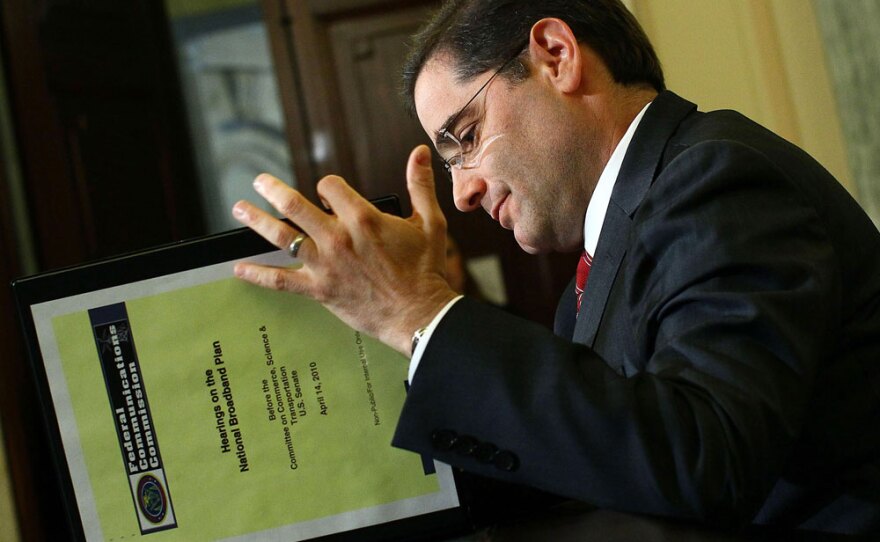Internet regulation: Public interest groups want more; Internet companies want less.
In between are the Federal Communications Commission and its ambitious National Broadband Plan to make Internet access faster and cheaper for all Americans.
Last month, that plan was in danger of being derailed by a federal appeals court, which cast doubt on the agency's authority to regulate broadband Internet. On Thursday, the FCC announced a way around the legal obstacles.
In a statement announcing the FCC's new plan, FCC Chairman Julius Genachowski used words like "moderate, cautious, disciplined."
"It is a narrow and tailored approach that will ensure we can protect and empower consumers, promote strong investment and innovation and [ensure] that we have a vibrant, open world-leading broadband Internet available to all Americans," he said in a video blog posted on YouTube.
While FCC officials wouldn't grant an interview for this story, it's clear they're trying to walk a fine line. On one side are public interest groups and companies like Google and eBay that want stronger regulation to ensure open access to the Internet for everybody. They were fairly happy with Thursday's announcement.
"This move will give the FCC authority to enforce net neutrality, which means all information on the web will be treated equally," said Josh Silver, founder of the nonprofit group Free Press. "And it will allow them to do many other aspects of the National Broadband Plan."
On the other side of the debate are the cable and phone companies that actually deliver broadband to most Americans. They want less regulation.
Rebecca Arbogast, an analyst at the investment firm Stifel Nicolaus in Washington, D.C., expects a long, hot summer in Washington filled with rhetoric. That's because the FCC proposal could hurt profits at the big Internet companies.
"It is not, I think as some have suggested, the end of the world and the sky is falling," she says. "That said, it is clearly a negative for Verizon, AT&T, Comcast, the cable providers."
The FCC used to regulate Internet access the same way it regulates phone companies: a lot. In 2002, the FCC itself deregulated Internet access. But that proved to be a problem two years ago, when the commission tried to punish Comcast Corp. for secretly blocking some traffic on its network. The cable company sued, and the FCC lost.
So now the FCC has announced it wants to re-regulate Internet access -- to go back, in part, to its pre-2002 way of doing business.
Mike Wendy of the free-market Progress and Freedom Foundation says that's the wrong approach.
"To the extent that it looks like 75-year-old rules that were developed around plain old telephone service, that will probably frustrate some investment," he says.
But the FCC insists its regulations won't hurt investment. And commission officials say they won't try to force Internet providers to open their lines to competitors, as phone companies must.

That's the biggest problem with the plan the FCC proposed today, says Silver.
"This is a reflection of the same weaknesses in the National Broadband Plan -- a good plan, great aspirations, but conspicuously missing the tough provisions that promote competition and drive down prices," he says.
So far, the FCC's compromise approach is drawing criticism from both sides. But the real test is how it will play in Congress, and inevitably in court -- where the telecom companies are sure to challenge it.
Copyright 2022 NPR. To see more, visit https://www.npr.org. 9(MDAzMjM2NDYzMDEyMzc1Njk5NjAxNzY3OQ001))







